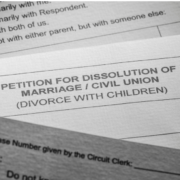It is not uncommon for couples starting the divorce process to live in separate states. Perhaps they have been separated for some time, or one spouse has recently moved to a different state to gain distance from the marriage. However, navigating a divorce when your spouse is out of state might be a bit more complicated than a typical divorce case.
Can you file for divorce from another state? Here are a few considerations for out-of-state divorce.
Where Should You File for Divorce?
Divorce cases typically cannot take place in two different states at one time. The spouse who files for divorce will do so in the state that then has jurisdiction over the case.
Many states have residency laws for filing for divorce. For example, to file for divorce in Pennsylvania, one or both of you must have resided in the state for six months or longer. These requirements might dictate who starts the divorce process in your marriage.
There could also be advantages to filing in a specific state. Some states, Pennsylvania included, allow for no-fault divorce, meaning you do not need to prove grounds for a dissolution of marriage. Review the divorce laws in both states and consider which would potentially allow for a more streamlined divorce process.
Do You Both Need Local Attorneys?
Can you file for divorce from another state? You can, but one spouse may need to travel to the other spouse’s state for in-person court appearances. You may wonder whether this means you need to hire an attorney in the state of filing or in your current state of residence.
There are potential advantages to both options. Hiring an attorney in your area makes it easier to meet with them and strategize about the case. However, hiring an attorney in the filing state ensures that they have the proper licenses to practice in that state and understand applicable divorce laws.
A good out-of-state attorney will help you manage communication, differing time zones, and other potential challenges.
Service of Process Across State Lines
Filing for divorce requires you to officially serve your spouse with the divorce papers. If your spouse resides in a different state, you can hire a process server in their area to complete the delivery.
Process servers often work with nationwide networks of professionals to deliver legal documents across the country. They can serve your spouse according to applicable state laws and even help you track them down, should your spouse be unreachable.
Developing Parenting Schedules Across State Lines
Finally, if you and your spouse share children, you will need to consider how parenting time will work if you live in different states. You may need to use mediation to resolve disagreements or allow the judge to determine a parenting schedule for you based on all relevant factors.
Hire Experienced Legal Counsel for Your Out-of-State Divorce
Karen Ann Ulmer, P.C., represents divorcees in Pennsylvania and New Jersey. We can help you file for divorce from another state and navigate any complexities that arise.
Contact us at (866) 349-4117 for a confidential consultation.







